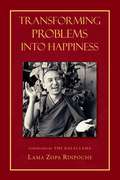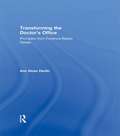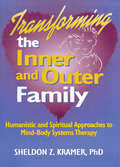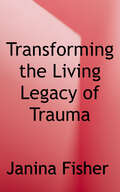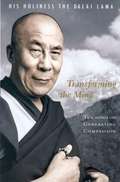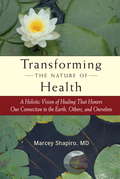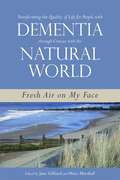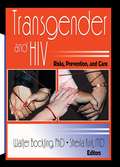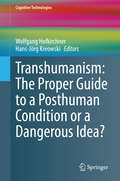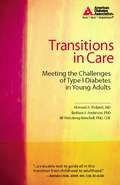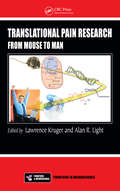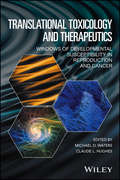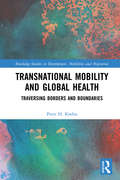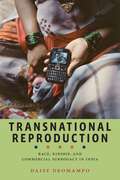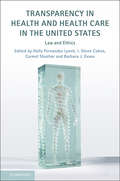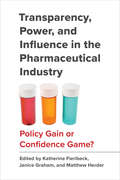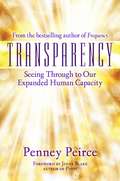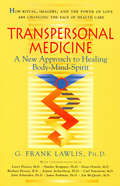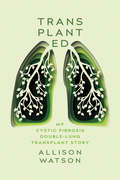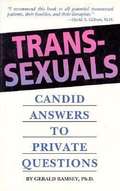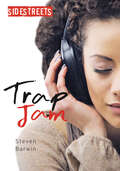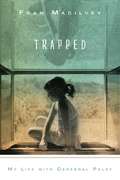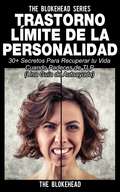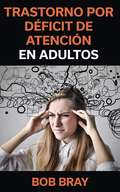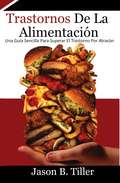- Table View
- List View
Transforming Problems into Happiness
by His Holiness the Dalai Lama Lama Thubten Zopa Rinpoche"Happiness and suffering are dependent upon your mind, upon your interpretation. They do not come from outside, from others. All of your happiness and all of your suffering are created by you, by your own mind," says Lama Zopa Rinpoche. Commenting on an early-twentieth-century Tibetan text of instructions and practical advice for everyday spiritual living, Lama Zopa Rinpoche teaches us how to be happy during hard times by adopting skillful attitudes--ways of interpreting reality that can permit us to live a joyful and relaxed life regardless of circumstance. In Transforming Problems Into Happiness, Lama Zopa Rinpoche brings his own special flavor and contemporary relevance to a timeless teaching on Buddhist psychology. This volume will be valuable to all, no matter the spiritual background of the reader or the kind of problems that have led them to ask that ageless question: How can I achieve happiness? This new edition includes a translation of the root text, Dodrupchen Rinpoche's (1865-1926) Instructions on Turning Happiness and Suffering into the Path of Enlightenment, translated by Tulku Thundop.
Transforming the Doctor's Office: Principles from Evidence-based Design
by Ann Sloan DevlinFrom the parking lot to the exam room, doctors can improve the physical surroundings for their patients, yet often they do not. Given the numerous and varied duties doctors must perform, it may fall to the design profession to implement changes, many based on research, to improve healthcare experiences. From location and layout to furnishings and positive distractions, this book provides evidence-based information about the physical environment to help doctors and those who design medical workspaces improve the experience of health care. Along with its research base, a special aspect of this book is the integration of relevant historical material about the office practice of physicians at the beginning of the twentieth century. Many of their design solutions are viable today. In addition to improving the physical design of healthcare facilities, author Ann Sloan Devlin is the granddaughter, daughter, and niece of physicians, as well as the granddaughter and daughter of nurses. She worked in a hospital during college, and has visited a good many practitioners’ offices in medical office buildings and ambulatory care settings. This book addresses an overlooked location of care: the doctor’s office suite.
Transforming the Inner and Outer Family: Humanistic and Spiritual Approaches to Mind-Body Systems Therapy
by E Mark Stern Sheldon Z KramerThis enlightening book integrates humanistic and transpersonal psychotherapy principles with family systems work. Transforming the Inner and Outer Family discusses a wide range of creative methodologies, such as the use of meditation, guided imagery, and energy centers in the body to bridge the inner and outer experiences of the individual and family members. Chapters explore the healing capacity of intense affect to unify significant others through the transformation of fear, anger, and grief to understanding, compassion, love, and forgiveness. The book is practical as well as theoretical, containing many case studies focusing on individual, couples, and family therapy. In addition, a special chapter is included on the use of family of origin sessions. Transcripts of actual cases show detailed methods of entering into the therapy system to promote change and demonstrate the operational definition of spirituality and its practical utilization in psychotherapy. Also included is a special candid interview between the author and Virginia Satir, mother of family therapy, nine months before she died, on her personal and professional life.Transforming the Inner and Outer Family presents an integrative family systems model that emphasizes the coordination of existential, humanistic, and transpersonal healing psychologies. This model coordinates Virginia Satir’s later thinking with Roberto Assagioli’s model of psychosynthesis. Author Sheldon Kramer blends principles of psychosynthesis with family systems work and thoroughly explains the use of his new model, Mind-Body Systems Therapy,™ including: development of internal family configurations the spiritual dimension within the systemic context integrating the use of the body with meditation in healing practices methods of healing the inner nuclear and intra-generational family bridging the inner and outer familial world stages of inner and outer healing the use of self in therapyTransforming the Inner and Outer Family is on the cutting edge of current emerging interests in alternative medicine, especially in holistic principles of healing, with emphasis on the spiritual dimension as a major healing conduit for transformation. Readers will discover in this book a solid theoretical base that integrates traditional psychology, including psychodynamic/object relations theory, with less-mainstream forms of psychotherapy, and will learn effective strategies for helping individuals, couples, and families heal.
Transforming the Living Legacy of Trauma: A Workbook for Survivors and Therapists
by Janina FisherTraumatic experiences leave a “living legacy” of effects that often persist for years and decades after the events are over. Historically, it has always been assumed that re-telling the story of what happened would resolve these effects. However, survivors report a different experience: Telling and re-telling the story of what happened to them often reactivates their trauma responses, overwhelming them rather than resolving the trauma. To transform traumatic experiences, survivors need to understand their symptoms and reactions as normal responses to abnormal events. They need ways to work with the symptoms that intrude on their daily activities, preventing a life beyond trauma.
Transforming the Mind: Teachings on Generating Compassion
by Dalai LamaIn his commentary on the Verses, His Holiness shows us how to cultivate wisdom and compassion in our daily lives. In particular, he teaches us how to think more positively and explains techniques to transform adverse situations into opportunities for spiritual growth. He shows us, by training and transforming our own mind, how we can effect changes in our own life and the lives of those around us.
Transforming the Nature of Health
by Marcey Shapiro Robert GoldenA provocative blend of personal memoir, new science, and philosophical treatise, this book presents a fresh model for healing by rethinking our relationships with one another, the natural world, our bodies, and our innermost selves. Dr. Marcey Shapiro focuses on eliminating us/them or friend/enemy dichotomies, shifting instead to a model based on enduring values of love, compassion, harmony, and peace. Throughout the book she reevaluates prevailing cultural beliefs about the causes and meaning of illness and offers a vision for a different type of societal understanding of health with a new view of the possible role of medicine in healing. Interweaving inspiring anecdotes from her experiences of the natural world, in medical training and practice, and with mystical exploration, Dr. Shapiro includes examples of medical advances that honor our interconnectedness and provides practical tools like breathing techniques, tips for self-examination, and methods for expanding awareness. Transforming the Nature of Health traces the roots of the matter/spirit split in contemporary science and medicine, evaluating its constraints as a paradigm for us as evolving beings. Dr. Shapiro presumes that we are much more than our physical bodies and asks readers to join in cocreating a new language and new science that express the whole of our miraculous existence.From the Trade Paperback edition.
Transforming the Quality of Life for People with Dementia through Contact with the Natural World: Fresh Air on My Face
by Malcolm Goldsmith Claire Craig John Killick Caren Price-Hunt Brian Hennell David G Mcnair June Hennell Johanna M. Wigg Trevor Jarvis Lynda Hughes Simone De Bruin Javier Sánchez Merina Jane Gilliard Rachael Litherland Marcus Fellows Daniel R. George Peter J. Whitehouse Neil Mapes Mary Marshall Brett Joseph James Mckillop Manjit Kaur Nijjar Lorraine Robertson Marie-José Enders-SlegersThis important book simply but persuasively demonstrates why we should provide the opportunities for people with dementia to experience the great outdoors. It also gives a voice to people with dementia who have felt the benefit of getting closer to nature. The contributors explore many different ways in which people with dementia can experience and interact with nature through pursuits such as farming, gardening and walking, and the book includes a chapter on the therapeutic, life-enhancing effects of activities with animals. The book includes descriptions of projects and initiatives from around the world that have revolutionised the everyday experience of people with dementia, and made a real difference to their quality of life. Illustrated with photographs amply demonstrating the power of nature to lift the spirits and enrich life, the book will be an inspiring guide for relatives, carers and professionals who want to help people with dementia lead a richer life, experience nature fully and enjoy its many accompanying benefits.
Transgender and HIV: Risks, Prevention, and Care
by Edmond J Coleman Walter O Bockting Sheila KirkDeliver effective services to this growing population! This volume presents the first collection of reports on the impact of HIV/AIDS on the transgender community worldwide. It includes a thorough description of the unique HIV risks of transgender people and exposes their largely neglected health and social service needs. This unique book also reports on the first generation of prevention interventions targeting this community, discusses guidelines for providing sex reassignment services to HIV-positive transsexuals, and encourages collaboration between communities at risk, researchers, and people in the helping professions.The social stigma faced by this population adds to their risk of HIV infection. Low self-esteem, rejection, neglect, employment discrimination, disenfranchisement, and a desire for acceptance and validation are all contributing factors. Yet, as the editors point out, “On the positive side, the transgender community has been able to mobilize and empower itself, and has found a voice that no longer can be ignored. We call on transgender and nontransgender people alike to work together to advance HIV prevention and promote our sexual health.”In Transgender and HIV you'll encounter: extensive discussions of the health, social service, and HIV prevention needs of the transgender community tips on how to work with marginalized communities in an empowering way explorations of the sexuality of both male-to-female and female-to-male transsexuals first-ever findings on sex reassignment surgery on HIV-positive individuals guidelines for surgery on HIV-positive transsexualsTransgender and HIV provides much-needed and often-requested information on HIV prevalence, risks, prevention, and care for this increasingly visible community.
Transhumanism: The Proper Guide to a Posthuman Condition or a Dangerous Idea? (Cognitive Technologies)
by Wolfgang Hofkirchner Hans-Jörg KreowskiThis book examines the contributions of the transhumanism approach to technology, in particular the contributed chapters are wary of the implications of this popular idea.The volume is organized into four parts concerning philosophical, military, technological and sociological aspects of transhumanism, but the reader is free to choose various reading patterns. Topics discussed include gene editing, the singularity, ethical machines, metaphors in AI, mind uploading, and the philosophy of art, and some perspectives taken or discussed examine transhumanism within the context of the philosophy of technology, transhumanism as a derailed anthropology, and critical sociological aspects that consider transhumanism in the context of topical concerns such as whiteness, maleness, and masculinity.The book will be of value to researchers engaged with artificial intelligence, and the ethical, societal, and philosophical impacts of science and technology.
Transitions in Care
by Barbara J. Anderson Howard A. Wolpert Michael A. HarrisProviding care for a young adult with type 1 diabetes during this stage can be difficult as well. Transitions in Care serves as a coaching manual for health care providers and parents, and as a guide to self-care and independence for young adults with diabetes. It demystifies a complicated period in a life with type 1 diabetes and makes the passage to adulthood easier for everyone involved.
Translational Pain Research: From Mouse to Man (Frontiers in Neuroscience)
by Lawrence Kruger Alan R. LightOne of the Most Rapidly Advancing Fields in Modern Neuroscience The success of molecular biology and the new tools derived from molecular genetics have revolutionized pain research and its translation to therapeutic effectiveness. Bringing together recent advances in modern neuroscience regarding genetic studies in mice and humans and the practical
Translational Toxicology and Therapeutics: Windows of Developmental Susceptibility in Reproduction and Cancer
by Claude L. Hughes Michael D. WatersWritten by leading research scientists, this book integrates current knowledge of toxicology and human health through coverage of environmental toxicants, genetic / epigenetic mechanisms, and carcinogenicity. Provides information on lifestyle choices that can reduce cancer risk Offers a systematic approach to identify mutagenic, developmental and reproductive toxicants Helps readers develop new animal models and tests to assess toxic impacts of mutation and cancer on human health Explains specific cellular and molecular targets of known toxicants operating through genetic and epigenetic mechanisms
Transnational Mobility and Global Health: Traversing Borders and Boundaries (Routledge Studies in Development, Mobilities and Migration)
by Peter H. KoehnTransnational Mobility and Global Health spotlights the powerful and dynamic intersections of human movement, inequality, and health. The book explores the interacting political, economic, social, cultural, and climatic drivers of health and migration, proposing innovative ways to enhance global health and care provision in an era of transnational mobility. As health security continues to rise up the agenda in international politics, the book also analyses the political determinants of health and migration. Within the framework of key drivers of unequal mobilities, this book treats interconnected health and migration themes not covered elsewhere under one cover: health tourism, conflict-induced and other vulnerable-population movements, humanitarian crises, human rights, the health-development linkage, migrant health-care, and health-competency education. The book also considers global health vulnerabilities in the wake of climate change, and the biomedical, ethical, and governance challenges of emerging and reemerging infectious diseases. Finally, the book suggests ways of evaluating mobility-influenced health outcomes and equity impacts, and explores how the global circulation of health expertise could help to rectify care-provider shortages. The challenges to global health considered in this book are only likely to become more intense as the 21st-Century surge in transnational migration continues. Readers will gain interdisciplinary appreciation for the relevance of health for migration and of migration for global health. Researchers, students, practitioners, and policy makers interested in individual and population health, sustainable development, and migration studies will find this book a useful and inspiring guide to contemporary global challenges.
Transnational Reproduction: Race, Kinship, and Commercial Surrogacy in India (Anthropologies of American Medicine: Culture, Power, and Practice #1)
by Daisy DeomampoTransnational Reproduction traces the relationships among Western aspiring parents, Indian surrogates, and egg donors from around the world. In the early 2010s India was one of the top providers of surrogacy services in the world. Drawing on interviews with commissioning parents, surrogates, and egg donors as well as doctors and family members, Daisy Deomampo argues that while the surrogacy industry in India offers a clear example of “stratified reproduction”—the ways in which political, economic, and social forces structure the conditions under which women carry out physical and social reproductive labor—it also complicates that concept as the various actors in this reproductive work struggle to understand their relationships to one another. The book shows how these actors make sense of their connections, illuminating the ways in which kinship ties are challenged, transformed, or reinforced in the context of transnational gestational surrogacy. The volume revisits the concept of stratified reproduction in ways that offer a more robust and nuanced understanding of race and power as ideas about kinship intersect with structures of inequality. It demonstrates that while reproductive actors share a common quest for conception, they make sense of family in the context of globalized assisted reproductive technologies in very different ways. In doing so, Deomampo uncovers the specific racial reproductive imaginaries that underpin the unequal relations at the heart of transnational surrogacy.
Transparency in Health and Health Care in the United States: Law and Ethics
by Holly Fernandez Lynch I. Glenn Cohen Carmel Shachar Barbara J. EvansTransparency is a concept that is becoming increasingly lauded as a solution to a host of problems in the American health care system. Transparency initiatives show great promise, including empowering patients and other stakeholders to make more efficient decisions, improve resource allocation, and better regulate the health care industry. Nevertheless, transparency is not a cure-all for the problems facing the modern health care system. The authors of this volume present a nuanced view of transparency, exploring ways in which transparency has succeeded and ways in which transparency initiatives have room for improvement. Working at the intersection of law, medicine, ethics, and business, the book goes beyond the buzzwords to the heart of transparency's transformative potential, while interrogating its obstacles and downsides. It should be read by anyone looking for a better understanding of transparency in the health care context.
Transparency, Power, and Influence in the Pharmaceutical Industry: Policy Gain or Confidence Game?
by Katherine Fierlbeck, Janice Graham, Matthew HerderThere is plenty of controversy surrounding pharmaceuticals, but it cannot be denied that the pharmaceutical industry is both socially beneficial and profitable. Regulators are expected to ensure that the economic success of the industry does not come at the expense of public safety, yet they have also assumed a cooperative role by providing advice on regulation and by targeting unmet medical needs. Concerns over regulatory standards, conflicts of interest, and the manipulation of information on drug safety and effectiveness have led to public mistrust and a greater need for transparency between the pharmaceutical industry and government regulators. Transparency, Power, and Influence in the Pharmaceutical Industry evaluates the progress made in holding the pharmaceutical industry responsible for creating transparency in the industry, from development to market. The contributors to this volume examine the various mechanisms introduced to make the regulatory process more informative and situate these efforts within the larger project of enhancing the safety of drugs, vaccines, and other products.
Transparency: Seeing Through to Our Expanded Human Capacity (Transformation Series)
by Penney PeirceA groundbreaking book with an inside-out view of personal transformation and the path to everyday enlightenment by letting go of the clutter, defense, and fears to instead focus on building the courage to be honest, vulnerable, authentic, and super-clear.Following the bestsellers The Intuitive Way, Frequency, and Leap of Perception, Transparency is the next book in Penney Peirce’s award-winning, visionary series of guidebooks on personal and societal transformation. Timely and revolutionary, Penney shows us how to let go of everything that gets in our way—the obstacles, clutter, and fears—to truly achieve greater authenticity, clarity of purpose, and feelings of belonging and joy. By transforming our opaque reality into a state of transparency, the dividing lines that fragment and isolate us melt away and all that’s left is the true self—connecting us to everything and everyone. Transparency helps you learn that when you’re transparent, there is great power in being seen for all of who you are. Secrets, lies, and hiding are no longer functional. Honesty, simplicity, compassion, and true humility produce genius. And, when you’re transparent, you’re empowered to see through situations that blind and confuse others. It’s as though you suddenly have Superman’s X-ray vision, and this enables you to reach just-right solutions, insights, and develop your ability to “see through,” so your intuition can skyrocket. Prescriptive, accessible, and thought-provoking, Transparency aims to help you identify your soul-blocking habits, find the insights being masked, and return these negative patterns back into the clear light of the unified field. Each piece of clutter dissolved, understood, and released creates greater transparency, opening us to experience our true selves and all the joys of life.
Transpersonal Medicine: The New Approach To Healing Body-mind-spirit
by G. Frank LawlisTranspersonal Medicine chronicles the pioneering efforts to apply a transpersonal orientation to the field of medicine. Broken into three parts, it reviews the underlying principles of transpersonal medicine. Part one focuses on ritual as a means of cross-personal empowerment. Part two is devoted to the personal ritual, the process of empowering one's inner strengths and wisdoms. Part three is dedicated to direct experiences and issues involved in medicine. The book includes interviews with leading researchers in each field of topics.
Transplanted: My Cystic Fibrosis Double-Lung Transplant Story
by Allison WatsonA poignant, witty memoir of learning to cope with a frightening genetic disease—and of a life transformed thanks to an organ donor.When Allison Watson awoke that day, she knew she was in a hospital bed. That's all. She had no idea how much time had passed since she’d seen her family. When she tried to focus, her vision was blurry, and when she tried to wave someone down, she became so exhausted she thought she was dying. Hours later, when Watson was able to communicate, she asked a nurse if the news was good or bad. “It’s good news,” the nurse replied. “You had your lung transplant four days ago.”Many cystic fibrosis patients are living longer today, thanks, in part, to transplants—though they are not easy to obtain. In this candid memoir, Watson describes living under the shadow of this incurable disease; her special bond with her sister, Amy, who also grew up with CF; and her life-altering surgery in Toronto in 2014. ; the r. Nor was the road to full recovery. In this book, Watson, who cycled across Canada with her brother in 2008 to raise awareness of CF, describes her journey.“Watson tells her resilient story of living with cystic fibrosis (CF), her progressive lung damage, the stress of waiting for an organ donor, her lifesaving transplant and life in the almost five years since her major surgery.” —The Guardian (Prince Edward Island, Canada)
Transsexuals: Candid Answers to Private Questions
by Gerald R. RamseyWATCH FOR SUBMITTER'S REVIEW TO BE ADDED SHORTLY Dr. Ramsey is a member of the Henry Benjamin International Gender Dysphoria Association, Inc. HBIGDA's well-known "Standards of Care" are listed as an Appendix. Note that these were the 1990 revisions and further revisions may have occurred. Ramsey clarifies many misunderstandings or questions via his lay-person's language to answer difficult questions. He himself states he supports even more restrictive timelines for treatment requirements than the HBIGDA's Standards. The Diagnostic and Statistical Manual of Psychological Disorders, IV (DSM-IV) section on Gender Identity Disorder is also included as an Appendix. Validator did not validate Appendices D & E or the bibliography. I think it's comprehensible, but if you need it improved, contact Cindy, popularplace@yahoo.com
Trap Jam (Lorimer SideStreets)
by Steven BarwinOlivia spends her nights drumming in a band, hanging out in clubs and drinking, and her days hungover at school. When her bandmate Lucas catches Olivia talking to her friend Raymond in the women's washroom, he beats up Raymond in a jealous rage. When Lucas tells Olivia that Raymond's criminal brother is looking for them for payback, they go on the run together. Lucas keeps Olivia drunk and off-balance, telling her he loves her and pressuring her to have sex with him. When Olivia finally discovers that the story about Raymond's brother is a lie, she realizes she has to get out of Lucas's obsessive trap. Distributed in the U.S by Lerner Publishing Group.
Trapped: My Life with Cerebral Palsy
by Fran Macilvey<p>An honest, unflinching, and inspiring memoir of living with a challenging disorder. <p> Fran Macilvery was born in the 1960s, when her parents were living in the Belgian Congo. Fran was the second of premature twins—and until the last moment, no one knew that twins were arriving. The complications and resulting delay led to Fran’s cerebral palsy. <p>Growing up with her siblings in Africa, Fran always felt different. When everyone else was playing and having fun, she would watch and wish she could join in. Eventually the family moved to Scotland and, as Fran grew older, her hurt turned into anger, self-hatred, and suicidal depression. Then one day, someone looked at her and saw a woman to love, and that was the start of her journey to self-acceptance. <p>A truthful and revealing look at the difficulty of maintaining the appearance of a “normal” life with CP, and the lessons learned along the way, Trapped is “an ideal firsthand account of the unique and largely unknown world of disability.</p>
Trastorno Límite de Personalidad. Una guía de autoayuda
by The BlokeheadEl trastorno Límite de Personalidad, en ocasiones referido como TLP o Borderline, es determinado como un trastorno mental que tiene un amplio rango de signos y síntomas. No todas las personas con trastorno límite de personalidad presentan cada posible síntoma y algunos individuos muestran ciertos síntomas de manera más aguda que otros. Típicamente, este es un término amplio que generaliza un tipo de trastorno de personalidad que hace difícil para quien lo padece el funcionar en lo que se considera un mundo normal. Cada vez más, la gente que lo padece es mental y emocionalmente inestable, a menos que tenga el tratamiento apropiado. Esto puede dificultar que alguien que sufre de esta enfermedad funcione normalmente y tiene una tendencia a irrumpir en todo aspecto de la vida de la persona afectada. Por lo tanto, típicamente encuentra difícil lidiar con muchas de las cosas que la gente puede manejar de manera diaria y también encuentra difícil el manejar exitosamente su vida tanto personal como profesional.
Trastorno por Déficit de Atención en Adultos
by María Florencia Lavorato Bob Bray¿Existe una conexión entre el Trastorno por Déficit de Atención, el Estrés Postraumático y las Adicciones? Si eres consciente de padecer alguna de estas afecciones, es posible que descubras que algo más profundo sucede en tu interior. Averígualo. ¡Consigue este libro ahora! A través de sus propias experiencias y educación, el autor ha llegado a la conclusión de que existe una fuerte conexión entre estas tres afecciones. Usualmente, son diagnosticadas y tratadas como eventos aislados. Sin embargo, Archives of General Psychiatry (Archivos de Psiquiatría General) publicó estudios en los cuales se evidencia la relación entre el TDA y la adicción, sin esclarecer. El autor comparte ejemplos tanto de su experiencia personal y de la de su hijo, en su lucha contra el TDA. También comparte situaciones en las que ha sido capaz de ayudar a los otros a superar estos "puntos de estancamiento" en sus vidas. El libro definitivo sobre Trastorno por Déficit de Atención y TDAH. Aprenderás sobre la definición y los síntomas del TDA, así como algunas de las razones por las cuales es mal diagnosticado. Las ideas falsas que existen en relación al TDA, incluyendo la creencia de que sólo afecta a los niños. Algunas de sus posibles causas, así como las consecuencias físicas, emocionales y sociales de la enfermedad. La tendencia hacia la auto-medicación; el uso del sexo, las apuestas o incluso de los conflictos con los demás para estimular las sustancias naturales como la adrenalina o la dopamina con el fin de alterar la mente. Los siete tipos de TDA. Cómo la depresión y la ansiedad, ocasionadas por un trauma infantil, se relacionan con el TEPT. La razón por la cual aquellas personas con TDA y los adictos se atraen entre sí. Cómo comprender mejor los signos de reincidencia y qué hacer al respecto. Algunas estrategias prácticas para lograr cambios en tu vida. Este no es un libro de texto exhaustivo sobre el TDA. Es cierto que
Trastornos de la Alimentación: Una guía sencilla para superar el trastorno por atracón
by Jason B. Tiller¿Desea deshacerse de problemas alimentarios y vivir una vida más feliz y satisfactoria? ¿Un bocado en una rosquilla se convierte con frecuencia en un atracón completo? ¿Lucha para controlar tu peso incluso cuando haces dieta? ¿Te sientes atrapado por esta obsesión y ansias de comer? Si es así, entonces estás en el lugar correcto. El trastorno por atracón no es solo el impulso físico de comer, sino la concentración emocional y consciente en la comida. El deseo de un consumo continuo de alimentos no tiene nada que ver con la disponibilidad de comida chatarra, sino con el impulso mental y emocional, que a menudo conduce al excitación. “TRASTORNOS DE LA ALIMENTACIÓN:UNA GUÍA SENCILLA PARA SUPERAR EL TRASTORNO POR ATRACÓN” es un producto de investigaciones bien detalladas realizadas por profesionales de trastornos de la alimentación. La pura ciencia detrás de la psicología del atracón se ha desmitificado en frases simples y fáciles de entender. Siguiendo los consejos que se proporcionan en este libro, puedes superar el atracón por tu cuenta. Puede superar las fluctuaciones de peso, los deseos de alimentos y la alimentación compulsiva. Contiene la clave para vivir una vida satisfactoria, comer bien y lograr la libertad total de los problemas alimentarios. Una vez que siga los consejos proporcionados en este libro, aprenderá cómo desarrollar habilidades para la vida para una alimentación saludable y acabará con el atracón permanente. Como beneficio adicional, la última sección de este libro proporciona consejos sobre cómo ayudar a un amigo con un trastorno por atracón. Para cambiar tu vida, desplázate hacia arriba y obtén este libro.
